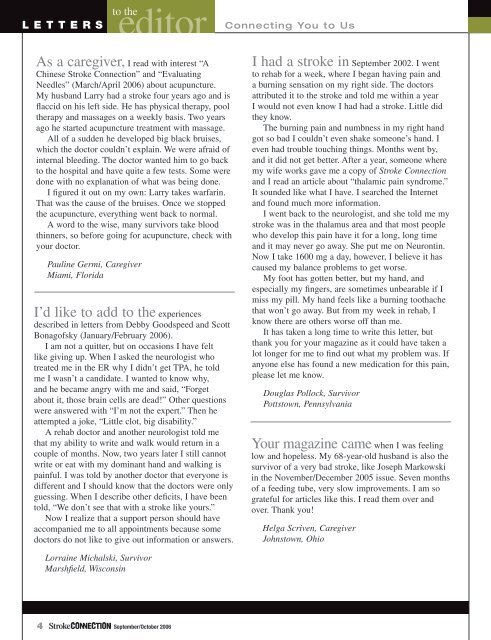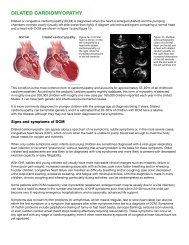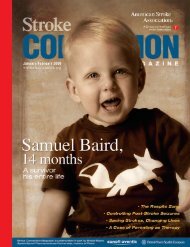Survivor Louise Ingram - American Stroke Association
Survivor Louise Ingram - American Stroke Association
Survivor Louise Ingram - American Stroke Association
You also want an ePaper? Increase the reach of your titles
YUMPU automatically turns print PDFs into web optimized ePapers that Google loves.
L E T T E R S<br />
As a caregiver, I read with interest “A<br />
Chinese <strong>Stroke</strong> Connection” and “Evaluating<br />
Needles” (March/April 2006) about acupuncture.<br />
My husband Larry had a stroke four years ago and is<br />
flaccid on his left side. He has physical therapy, pool<br />
therapy and massages on a weekly basis. Two years<br />
ago he started acupuncture treatment with massage.<br />
All of a sudden he developed big black bruises,<br />
which the doctor couldn’t explain. We were afraid of<br />
internal bleeding. The doctor wanted him to go back<br />
to the hospital and have quite a few tests. Some were<br />
done with no explanation of what was being done.<br />
I figured it out on my own: Larry takes warfarin.<br />
That was the cause of the bruises. Once we stopped<br />
the acupuncture, everything went back to normal.<br />
A word to the wise, many survivors take blood<br />
thinners, so before going for acupuncture, check with<br />
your doctor.<br />
Pauline Germi, Caregiver<br />
Miami, Florida<br />
I’d like to add to the experiences<br />
described in letters from Debby Goodspeed and Scott<br />
Bonagofsky (January/February 2006).<br />
I am not a quitter, but on occasions I have felt<br />
like giving up. When I asked the neurologist who<br />
treated me in the ER why I didn’t get TPA, he told<br />
me I wasn’t a candidate. I wanted to know why,<br />
and he became angry with me and said, “Forget<br />
about it, those brain cells are dead!” Other questions<br />
were answered with “I’m not the expert.” Then he<br />
attempted a joke, “Little clot, big disability.”<br />
A rehab doctor and another neurologist told me<br />
that my ability to write and walk would return in a<br />
couple of months. Now, two years later I still cannot<br />
write or eat with my dominant hand and walking is<br />
painful. I was told by another doctor that everyone is<br />
different and I should know that the doctors were only<br />
guessing. When I describe other deficits, I have been<br />
told, “We don’t see that with a stroke like yours.”<br />
Now I realize that a support person should have<br />
accompanied me to all appointments because some<br />
doctors do not like to give out information or answers.<br />
Lorraine Michalski, <strong>Survivor</strong><br />
Marshfield, Wisconsin<br />
September/October 2006<br />
Connecting You to Us<br />
I had a stroke in September 2002. I went<br />
to rehab for a week, where I began having pain and<br />
a burning sensation on my right side. The doctors<br />
attributed it to the stroke and told me within a year<br />
I would not even know I had had a stroke. Little did<br />
they know.<br />
The burning pain and numbness in my right hand<br />
got so bad I couldn’t even shake someone’s hand. I<br />
even had trouble touching things. Months went by,<br />
and it did not get better. After a year, someone where<br />
my wife works gave me a copy of <strong>Stroke</strong> Connection<br />
and I read an article about “thalamic pain syndrome.”<br />
It sounded like what I have. I searched the Internet<br />
and found much more information.<br />
I went back to the neurologist, and she told me my<br />
stroke was in the thalamus area and that most people<br />
who develop this pain have it for a long, long time<br />
and it may never go away. She put me on Neurontin.<br />
Now I take 1600 mg a day, however, I believe it has<br />
caused my balance problems to get worse.<br />
My foot has gotten better, but my hand, and<br />
especially my fingers, are sometimes unbearable if I<br />
miss my pill. My hand feels like a burning toothache<br />
that won’t go away. But from my week in rehab, I<br />
know there are others worse off than me.<br />
It has taken a long time to write this letter, but<br />
thank you for your magazine as it could have taken a<br />
lot longer for me to find out what my problem was. If<br />
anyone else has found a new medication for this pain,<br />
please let me know.<br />
Douglas Pollock, <strong>Survivor</strong><br />
Pottstown, Pennsylvania<br />
Your magazine came when I was feeling<br />
low and hopeless. My 68-year-old husband is also the<br />
survivor of a very bad stroke, like Joseph Markowski<br />
in the November/December 2005 issue. Seven months<br />
of a feeding tube, very slow improvements. I am so<br />
grateful for articles like this. I read them over and<br />
over. Thank you!<br />
Helga Scriven, Caregiver<br />
Johnstown, Ohio







